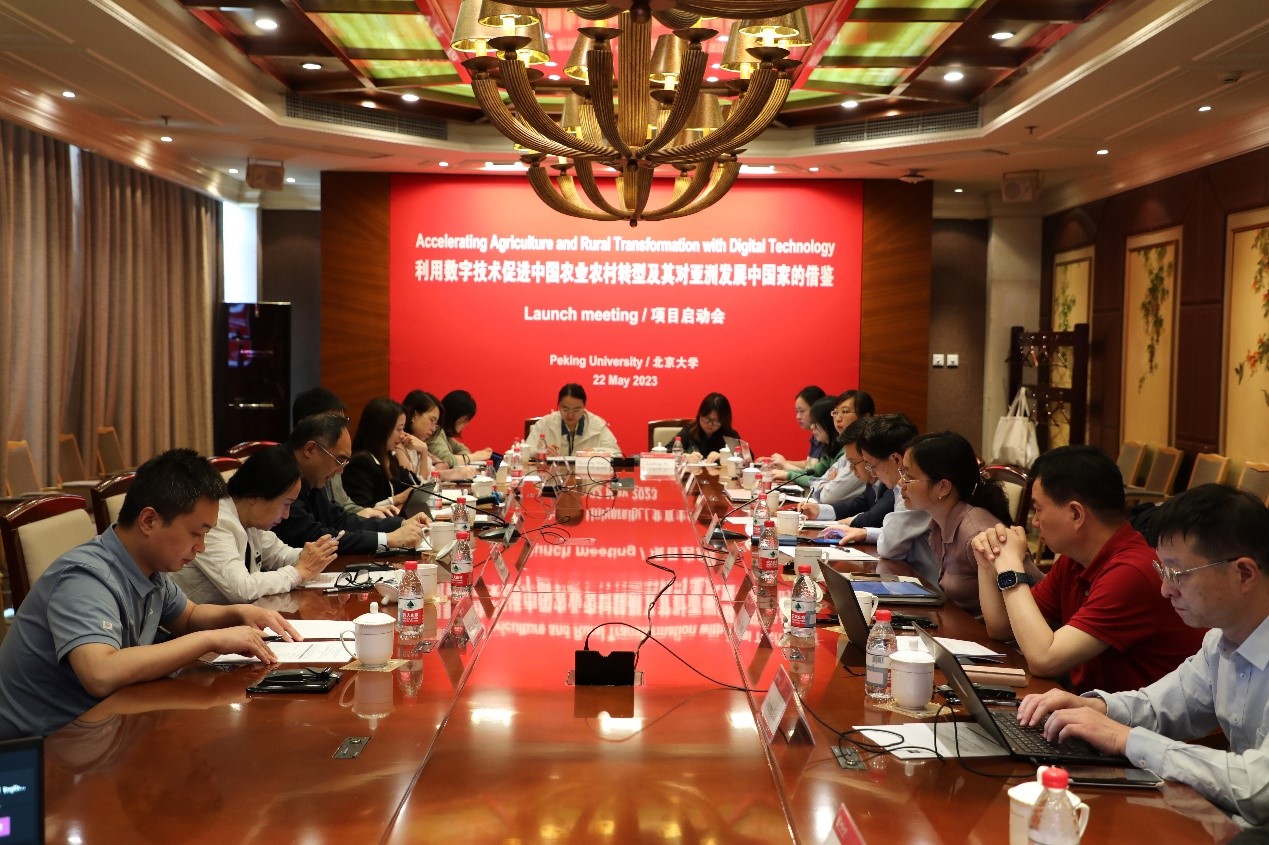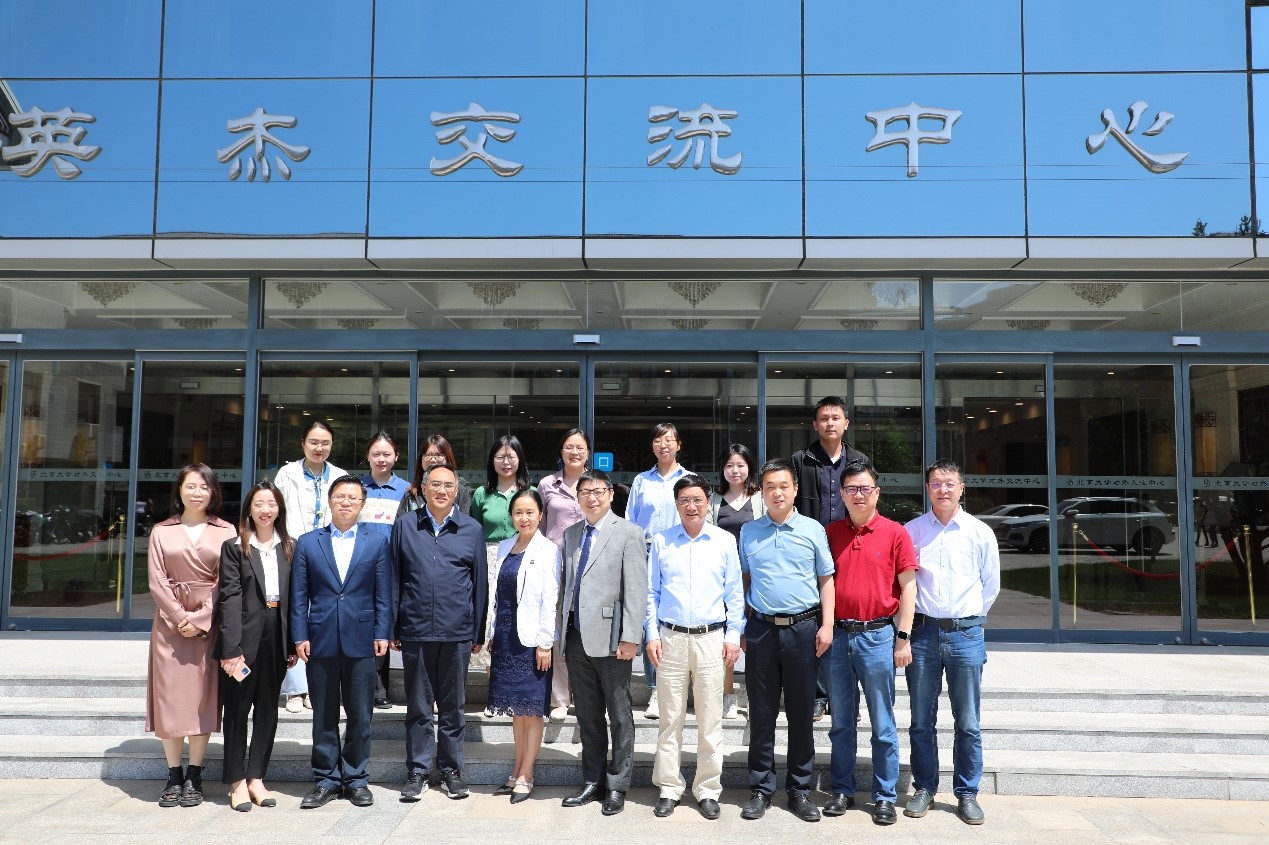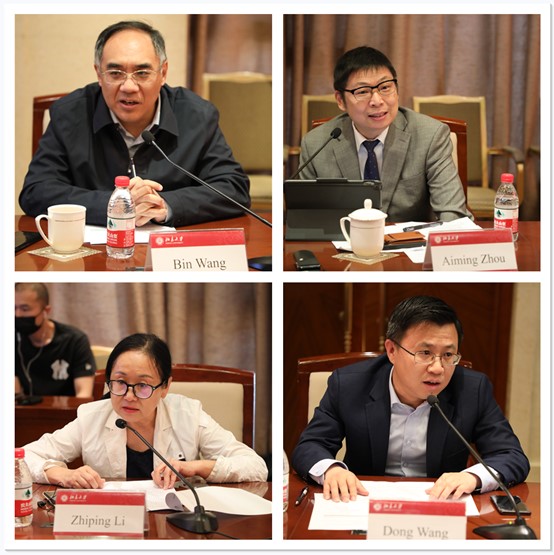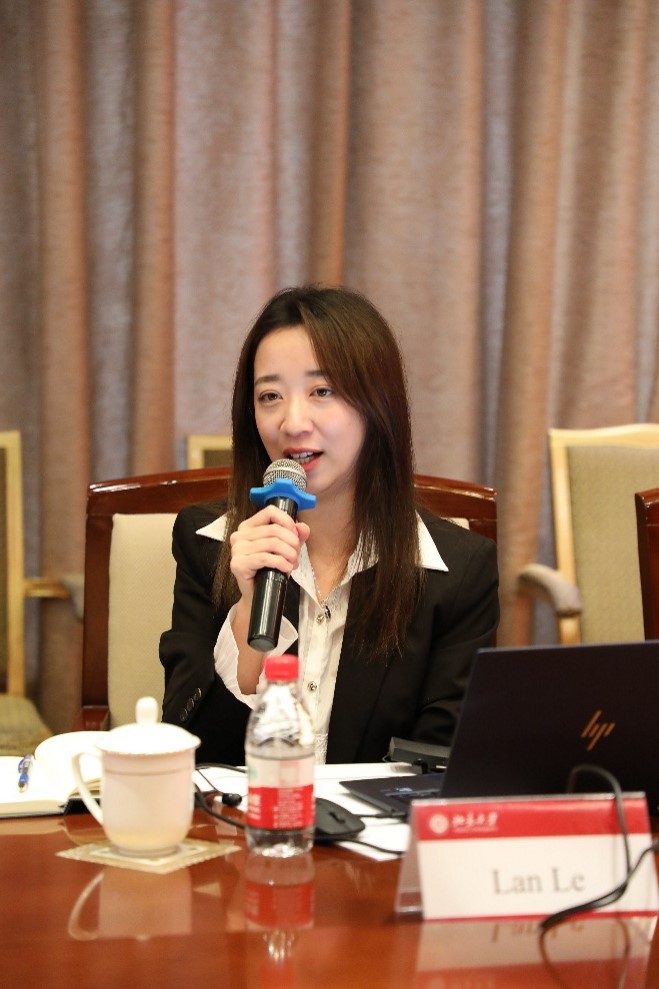current location: Home> Central News
Central News
Successful launch of the ADB project on "Digital Technology for Sustainable, Resilient, and Inclusive Agricultural and Rural Transformation in China and Implications for Other Developing Countries in Asia"
Release date:2023/05/23 Source: CCAP
On May 22, 2023, the Center for Chinese Agricultural Policy (CAP) of Peking University (Peking University), the Ministry of Agriculture and Rural Development (MARD), and the Asian Development Bank (ADB) held a kick-off meeting of the project "Digital Technologies for Sustainable, Resilient and Inclusive Agricultural and Rural Transformations in China and Lessons for Other Developing Countries in Asia" at the Yingjie Exchange Center of Peking University. The meeting was attended by relevant members of the project team from the Ministry of Agriculture and Rural Development, the Asian Development Bank and Peking University.


Opening speeches were delivered by Wang Bin, Deputy Director General, Department of Policy and Reform, Ministry of Agriculture and Rural Affairs; Zhou Aiming, Deputy Representative, Asian Development Bank Representative Office in China; Li Zhiping, Deputy Director General, Center for Foreign Economic Cooperation, Ministry of Agriculture and Rural Affairs; and Prof. Wang Dong, Vice Minister, Department of Social Sciences, Peking University.

In his speech, Deputy Director Wang Bin pointed out that the 20th National Congress report proposed for the first time to accelerate the construction of a strong agricultural country, and the importance of digital technology is self-evident as it plays an important role in the intelligentization of agricultural production, expanding sales channels for agricultural products, and upgrading the level of rural governance. He emphasized that in addition to the technology itself, the government needs to address a series of institutional and mechanism issues, and that it is crucial to learn from domestic and international development experiences and explore institutional mechanisms that are inclusive, green and developmental. Deputy Representative Zhou Aiming emphasized that this project is an ADB technical assistance project and that the development of digital technology in China presents both challenges and opportunities. He hoped that through ADB's platform, China's story could be told to the world so that rural agriculture in general, and developing countries in particular, could embrace digital technology. Representative Zhou also expressed his best wishes for the smooth launch and implementation of the project. Director Li Zhiping stated that the Chinese government attaches great importance to agricultural and rural service policies and reforms, and highlighted the Smart Agriculture Expo recently organized by the Ministry of Agriculture and Rural Development. She noted that this project has a new concept, good topic selection, and strong team, and has high academic value and practical significance. She also expressed her appreciation for ADB's contribution in supporting China and other developing countries in the areas of digital technology, agriculture and food security poverty reduction. On behalf of Peking University, Vice Minister Wang Dong expressed his warm welcome to the representatives from the Ministry of Agriculture and Rural Development and the Asian Development Bank. He introduced the structure of Peking University's School of Modern Agriculture and agriculture-related research institutes, emphasized the importance that Peking University attaches to the construction of and research on agricultural disciplines, and highly affirmed the professionalism of the CCAP team and its members, who are honored to undertake this project.

The project team leader, Prof. Huang Ji-Kun of Advanced Agriculture of Peking University, made a systematic report on the project's initial research findings, baseline research and implementation plan of the consulting project, which included five aspects, including potential roles and opportunities, practice progress, effects and challenges, research objectives and content, research methodology and plan, and major issues. Prof. Huang sorted out the Chinese government's policies on digital agriculture and rural development, introduced the research that has been completed so far, and demonstrated the use of existing digital agriculture technologies in China, such as ICT infrastructure, logistics and transportation, intelligent wind turbines, plant protection drones, and blockchain traceability technology, through research data and case studies. He pointed out that e-commerce is the best developed and farmers have limited benefits from it, while the development of digital villages in counties is in its infancy and there is still a big data gap. Professor Huang emphasized the great potential role of digital technologies, but the empirical basis and farmers' needs need to be explored in depth to find out the limiting factors and explore the drivers and pathways of digital adoption. He pointed out that existing statistics were not sufficient to support the study, so further data research and case studies were needed, drawing on international experience.

Lan Le, Environmental Economist, Project Director, Asian Development Bank, and representatives of the Ministry of Agriculture and Rural Affairs both recognized the progress made in the early stages and the overall research framework. Director Wang Bin suggested that a distinction needs to be made between smart agriculture and digital villages, with the former being related to the production chain and the latter emphasizing more on digital village governance, and that the need for guidance on the application of digital technology in production is more pressing in light of the actual problems faced by the absolute majority of regions living and producing their own lives at present. In addition, Director Wang and project members and ADB representatives discussed the feasibility of digital financial research. Director Wang Maolin of the Reform and Experimentation Division of the Department of Political Reform of the Ministry of Agriculture and Rural Affairs and Deputy Director Hao Miao of the International Organizations Division of the Center for Foreign Economic Cooperation (FECO) spoke on the provision of a platform for experimental zones and the dissemination of international experience and related budgetary issues, respectively.
At the end of the meeting, the project team and ADB finalized the details of the objectives, budget, potential issues and timeline in the project inception report. In the next step, the project team will follow the instructions of the Ministry of Agriculture and Rural Development and ADB to implement the project program in practice, complete and deliver the project results with high quality, and realize the knowledge sharing of the project results.



 Home
Home



